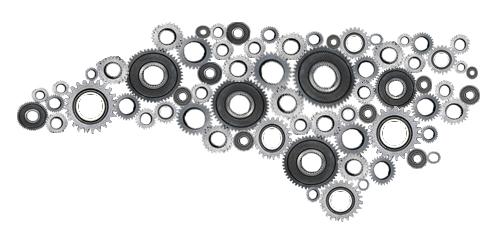Steel factories, conveyor belts and sweaty workers are images that scream “manufacturing.” These things do not define manufacturing in North Carolina and they never have.
Until the late 20th century, manufacturing in the state revolved around tobacco —growing it, processing and packaging it — textiles and furniture. Today, it revolves around pharmaceuticals and technology, and makes up roughly 20 percent of the state’s economy.
North Carolina manufactures twice as much as the national average, and the state is the fourth biggest manufacturer in the country. The face of this sector is changing, said Michael Walden, William Neal Reynolds distinguished professor and extension economist at N.C. State.
Walden said renewed political interest in the manufacturing sector could be good for the state, but should not be expected to provide ample job opportunities.
“We are never going to see the kinds of numbers of workers in manufacturing [again],” Walden said. “We make products much differently today than we did 50 or 100 years ago.”
Businesses in the state produce technology, but many times technology is the producer itself, often eliminating the necessity of human laborers, Walden said.
“It is much more technological and machinery oriented,” Walden said, referring to new automated processes that cut down demand for human labor.
Technology is crucial to both sides of the manufacturing process in North Carolina, but a large human workforce is still necessary for a well-oiled manufacturing sector. New policies are in the works to train those workers.
“There has been a lot of new talk about pushing vocational educational opportunities down to the high school level,” Walden said.
Walden said high school students who don’t have interest or aptitude to attend a four-year university may soon be able to take vocational courses to train for a specific industry. Many of these vocational courses would center on manufacturing.
Gov. Pat McCrory said he supports vocational high school and community college preparing students in specific manufacturing fields. Community colleges already often work hand-in-hand with businesses to make sure manufacturing positions are being filled.
“If North Carolina attracts a manufacturing firm in some part of the state, and they need workers trained in a particular way, our community college system will develop a customized training program to train those workers,” Walden said.
Specialized manufacturers need specialized workers, and education largely focuses on manufacturing management in fields like pharmaceuticals and energy.
Ashley Hedrick, a public policy staff member for the Charlotte Chamber of Commerce, said manufacturing energy plays a large role in the state and its largest city.
“We are very focused around energy and a lot of our manufacturing specifically growing into the area tend to be in that field,” Hedrick said.
Hedrick said manufacturing has changed, but the public often does not conceive it that way.
“The thing I have noticed the most is that manufacturing has gone from this unclean, unsafe kind of perspective to a whole different [process],” Hedrick said.
Marshall Brain, the founder of HowStuffWorks and speaker at today’s event ManufacturingWorks@NCState, said the U.S. is a leader in clean manufacturing, and a resurgence of manufacturing in North Carolina won’t pollute the state’s environment.
“If you go visit factories, there is a gigantic effort to make zero impact,” Brain said. “Economically, it makes sense for factories to reduce and eliminate waste. Subaru has basically created zero impact factories. Everything. All the packing is recycled. There are basically no emissions. It makes sense for the environment, the economy and the social conscious. That mentality is permeating the manufacturing landscape for these reasons. It is largely invisible, but it’s a powerful trend.”
Imagery of the industrial revolution doesn’t represent manufacturing today, but the term “manufacturing” can still be easily defined, according to Walden.
“Essentially, the definition of manufacturing is the same,” Walden said. “It is the creation of a durable product, something that is long-lasting, something you can touch.”
Manufacturing looks different today than it did 50 years ago, but it still manages to play an important economic role in North Carolina. Today, the state is moving away from tobacco and textiles, and now toward sustainable, high-tech, more stable industries.
“I think people probably historically thought of manufacturing as cars, appliances and steel,” Walden said. “Of course that is important but with growth of the medical care sector, providing pharmaceuticals is much more important.”
ManufacturingWorks@NCState will take place:
- When: Monday, March 25, 1-5 p.m.
- Where: Hunt Library Institute for Emerging Issues Multi-Purpose Room (Second Floor)
Who will be there?
- Business experts and leaders
- Marshall Brain, founder of HowStuffWorks
- Alumni in the manufacturing field from companies like IBM, Fujifilm Biotechnologies, GoPro and the North Carolina Technology Association
Why is it important?
- North Carolina’s leading economic machine is the manufacturing industry.
- Students will have the opportunity to interact with panelists and network with industry representatives.
Get Registered (recommended, but not required):
- http://manufacturingworksncstate.eventbrite.com/








